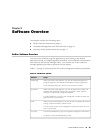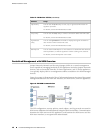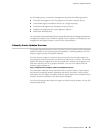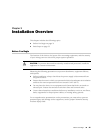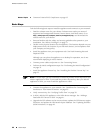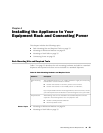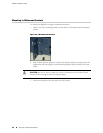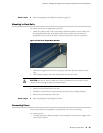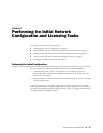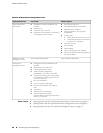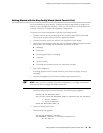
Related Topics ■ Common Criteria EAL2 Compliance on page 63
Basic Steps
Take the following basic steps to install the appliance and connect it to your network:
1. Read the release notes for your release. Release notes make you aware of
supported and unsupported features, known issues, and fixed issues. Go to
http://www.juniper.net/techpubs/software/management/idp/ and download the
release notes for your release.
2. Become familiar with the safety and security guidelines that pertain to your
installation. See “Before You Begin” on page 21.
3. Decide on the physical location for the appliance. The location depends on your
deployment mode, the location of your network devices, and compliance with
your company security policy.
4. Install the appliance into your equipment rack. See Rack Mounting Kits and
Required Tools.
Although you can place the appliance on a desktop for operation, we do not
recommend deploying it in this manner.
5. Connect power cables and power on. See Connecting Power.
6. Perform the initial configuration steps. See “Performing the Initial Configuration”
on page 27.
7. Install the appliance license key. See “Installing the Product License Key” on
page 32.
NOTE: In these steps, you are instructed to install the product license key before you
add the appliance to NSM. If you install the product license key after you add the
appliance to NSM, you must re-add the appliance to NSM.
8. Connect the appliance to your network. See “Guidelines for Connecting IDP
Interfaces to Your Network Devices” on page 35.
9. Verify connectivity. See “Verifying Traffic Flow” on page 38.
10. In NSM, add the IDP appliance to the NSM device manager. See “Adding a
Reachable IDP Device to NSM” on page 41.
11. Upgrade the IDP software to the current release, update the IDP detector engine
firmware, and update the NSM attack object database. See “Updating Software
(NSM Procedure)” on page 49.
22 ■ Basic Steps
IDP250 Installation Guide




